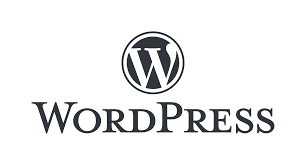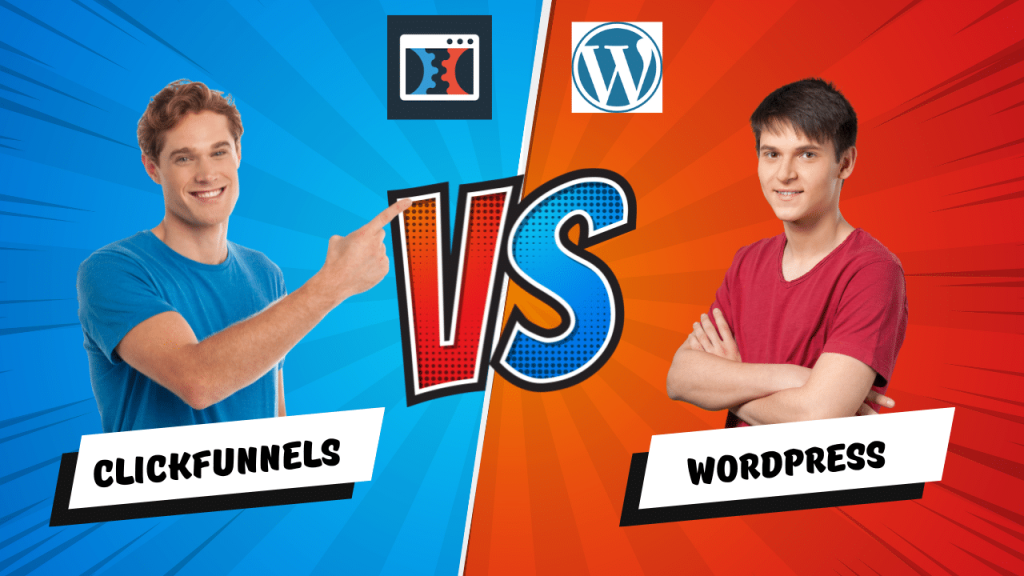When you enter the online world, choosing the right platform is critical for your business’s success. It’s a battle between ClickFunnels and WordPress, two giants in digital platforms. ClickFunnels and WordPress are popular among website owners, entrepreneurs, and businesses. But which one truly meets your unique needs? We will discuss the features, advantages, and drawbacks to make things easier for you. In this detailed comparison, we’ll look closely at ClickFunnels and WordPress. This is not just a comparison; it’s about shedding light on which platform best serves your business objectives.
Clickfunnels Vs. WordPress
What is WordPress?

WordPress is a big name in the web world. It’s a Content Management System (CMS)software that helps you build websites. You may want a blog, a portfolio, an online store, or a business site. WordPress makes it all possible, even if you don’t have advanced tech knowledge.
There are two ways to use WordPress. The first is WordPress.org. It’s free and open-source. You can download it from the official site. It’s self-hosting, meaning you find and host it yourself. The second way is WordPress.com. This one’s a commercial website builder. It’s a hosted platform. Here you can create your site directly without worrying about hosting. Both versions have their good points and bad points. So check all the necessary details to choose between WordPress.org and WordPress.com.
What are the Key Features of WordPress?
WordPress has many crucial features. Let’s have a look at some of them.
- Editors: Full Site Editing (FSE) lets you build the whole site quickly.
- Plugins: Find free and premium plugins in the plugin directory and marketplaces.
- Themes: Over 10,000+ free themes and paid options for site design.
- Customization: There are lots of options to personalize your site. Use a page builder plugin for quick setup.
- Custom Codes: Write your code with Java, HTML, PHP, and CSS for more control.
- eCommerce: WooCommerce and other plugins to create an online store. eCommerce templates are available.
- Integration: Works with payment gateways, CRM, and more.
- Website Niche: Plugins and themes for memberships, online courses, blogs, etc.
- Security: Keep the core platform updated and use strong security plugins.
- Image editor: Crop, resize, add caption and alt text to images.
What is ClickFunnels?

ClickFunnels is a powerful funnel builder and an all-in-one solution for businesses. It’s like a digital road for your target audience, turning site visitors into paying customers. Even if you’re starting, ClickFunnels helps you sell, market, and deliver your products and services without much experience.
But ClickFunnels is more than that. It’s also a landing page builder. You can create great-looking landing pages to make your funnels even better. The latest version, ClickFunnels 2.0 even more features to explore.
It’s different from WordPress, which is a free website builder. ClickFunnels offers a hosted site builder. This means you can start your website right away using your funnels. It’s perfect for selling physical and digital products, memberships, or online courses.
Also Read: Kajabi vs ClickFunnels
What are the Key Features of ClickFunnels?
Like WordPress, ClickFunnels also has many crucial features. Let’s discuss some of them.
- ClickFunnels Editor: A drag-and-drop editor to build professional and customizable sales funnels, websites, landing pages, and eCommerce stores.
- Themes and Templates: Many customizable themes and templates for designing landing pages and proven funnels.
- eCommerce Stores: Easily build an online store for physical and digital products—features like recurring subscriptions and high-converting checkout.
- Online Course: Create courses with course schedules, content drip, user enrollment, etc.
- Membership Sites: Create a membership website with members-only content. Promote a wide range of content.
- Email Marketing: Built-in email marketing to send emails at the right time. Great for promotions and new offers.
- Workflows: Automate marketing with drip campaigns.
- A/B Testing: You can test multiple variations of pages, messages, campaigns, funnels, and workflows.
- Analytics: Track the performance of your business—for example, course progress and the effectiveness of funnels.
ClickFunnels vs WordPress: The Main Difference
User-Friendliness and Ease of Use
ClickFunnels is excellent for the non-technical user. It has a straightforward interface. You can create sales funnels with pre-built templates. These templates are customized using a drag-and-drop visual editor. The simplicity of ClickFunnels is just suitable for entrepreneurs who want to spend their time on something other than technical details. They can set up their funnels quickly and easily.
WordPress needs some technical skills. It’s powerful, but there’s a learning curve. Luckily, the WordPress community has lots of resources to help beginners. You can manage every part of your website, from the content to the layout. But, remember, with great control comes more complexity. You’ll often have to handle hosting, updates, and backups yourself. However, this is something to consider if you want total control over your site.
E-commerce Capabilities and Integrations
For e-commerce, ClickFunnels has some great built-in features. It comes with a shopping cart and integrates with many payment gateways. It can make sales processes smooth and easy, guiding customers from being interested to making the final purchase.
WordPress is a bit different. You need plugins like WooCommerce to add e-commerce functionality. This might be an extra step, but it offers many customization options. You can do much with a WordPress online store, from selling digital downloads to running large-scale retail operations.
Customization and Flexibility
ClickFunnels has good customization options. Users can adjust colors, fonts, and elements in its funnel templates. But, the customization mostly sticks to the sales funnel functionality.
WordPress is an open-source platform that’s flexible. There are thousands of themes and plugins so you can do almost anything. The possibilities are nearly endless. Down to the smallest detail, you can customize your site to be just how you want. WordPress lets you create something unique if you’re ready to spend time on it.
Marketing Tools and SEO
ClickFunnels shines with its marketing tools and data. It’s perfect for funnel building and conversion rate optimization. You get features like email integrations, A/B testing, and analytics. All these can help to increase your sales.
With plugins like Yoast SEO, WordPress brings a lot to the table for search engine optimization (SEO). However, if we compare ClickFunnels SEO with WordPress SEO, WordPress wins. It offers comprehensive tools to help your site rank higher in search engine results. The flexibility of WordPress means you can use various marketing strategies, not just sales funnels. It’s great for those who want to go beyond just funnel-based marketing.
Pricing and Scalability
ClickFunnels uses a subscription model with different options. The price depends on the features, number of funnels, and pages you need. As your business grows, ClickFunnels can become more costly. This is especially true if you need complex funnels or more traffic capacity. Prices start at $127/month but keep in mind they can increase.
WordPress, on the other hand, is free to use. But, there are still costs to consider, like hosting, premium themes, domain registration, plugins, and sometimes development work. Even with these costs, WordPress is more economical than ClickFunnels. This is because many pricing options are available for hosting and additional services. So, you can find something that fits your budget as your site grows.
Final Thoughts
When deciding between ClickFunnels and WordPress, consider your specific needs. ClickFunnels is a user-friendly tool ideal for creating effective sales funnels, especially if you have limited technical skills, but it comes at a higher price. WordPress, on the other hand, offers more flexibility and customization for website building. It’s great for those with some technical knowledge and has a free option, but you’ll need extra themes and plugins for complex features. Both are excellent but serve different purposes so that the ultimate decision will be based on your needs.







